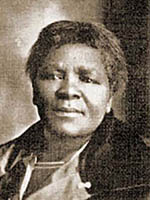Classic DACB Collection
All articles created or submitted in the first twenty years of the project, from 1995 to 2015.Maxeke, Charlotte Manye

Maxeke was a leader in the African Methodist Episcopal Church, the first African woman from South Africa to obtain a B.Sc. and the first African woman to be made a probation officer. She may also be called the ‘Mother of Ethiopia’ because of the part that she played in the amalgamation of the Ethiopian Church and the African Methodist Episcopal Church.
She was born on 7 April 1872, near Fort Beaufort (Skota gives 1874 as the date of her birth but 1872 is used by her sister Katy). Her mother was a teacher and her father a foreman on the road gangs. He was also a lay preacher in the Presbyterian Church. Charlotte attended primary school in Uitenhage and senior school in Port Elizabeth. She planned to be a teacher.
Just before the family moved to Kimberley in 1890 Charlotte and her sistcr Katy were invited to join the Jubilee singers and tour Britain. This was an exciting time and the choir was even asked to sing for Queen Victoria. During the tour Charlotte met students from Wilberforce University in America and realised for the first time that in America there were opportunities for black students which were not available in South Africa. The two sisters learned to speak English fluently with a British accent. When they returned home both were given the opportunity of touring America with the McAdoo singers. Katy decided to remain at home and later became dispenser for Dr. McCord of the American Board Mission. Charlotte travelled to America to join the choir.
While in America she met Bishop Derrick of the African Methodist Episcopal Church, who arranged for her to study at Wilberforce University, Ohio. She managed to arrange opportunities for other African students to study at Wilberforce. One of the students was Marshall Maxeke, who would later become her husband. Others were James Tantsi, Charles Dube, Henry Msikinya and Edward Tolityi Magaya.
While Charlotte was in America, changes had been taking place in the church in the Transvaal. Her mother’s cousin, Mangena Mokone, decided to leave the Methodist Church and form his own Ethiopian Church. Katy read her sister’s letters to Mokone. The letters told of a church in America under black control where there was opportunity for education and for leadership. Mokone discussed what he had heard with the other leaders of the Ethiopian Church. In 1896 they decided to invite the AMEC to amalgamate with the Ethiopian Church. Charlotte Manye acted as an intermediary. She became one of the pioneers of the South African AMEC. Although as a woman she could not be an elder, she served on the missionary committee and was invited to give talks on mission at the AMEC conferences. In 1901 Charlotte said that she was thrilled to be asked to speak and ‘congratulated herself on the rare opportunity afforded her … to speak to her own conference for the first time in her lowly life’.
In 1903 Charlotte Manye married Marshall Maxeke, who by now had a B.A. from Wilberforce. They worked together as missionaries for the AMEC, first in Pietersburg in the Transvaal and then in Idutywa in the Eastern Cape. There they were invited to establish a school by the headman, Enoch Mamba, who had had a disagreement with the colonial authorities.
Education became a priority for the Maxekes and in 1908 they established Wilberforce Institute for the AMEC at Evaton in the Transvaal. The influence of Charlotte Maxeke was beginning to be more widely felt. She was asked to speak at meetings on various subjects. For example, at the 1925 General Missionary Conference she read a paper entitled ‘The native Christian mother’.
Maxeke was a founder member and president of the Bantu Women’s League, a forerunner of the ANC Women’s League. Her husband had been a member of the ANC from its inception so she had the interests of the organisation at heart. Maxeke, through the league, worked for the relaxation of the Free State pass laws.
When the Maxekes moved to Johannesburg Charlotte’s concerns centered on the church. She involved herself in social action and started an employment bureau. She was made a probation officer, the first African woman to hold such a post. Her work at the courts brought her into contact with the effects of the breakdown of family life and the problems caused by the migrant labour system. She sought a common meeting ground between white and black women but met with little success. Through this she hoped to foster a better understanding of the problems facing urban Africans.
In 1928 Maxeke was sent to America as a delegate to the AMEC Conference. During the 1930s she continued to address meetings such as the 1935 All African Convention at Bloemfontein where she played a leading role in the establishment of the National Council of African Women. Busy to the end, she died four years later in 1939.
J. A. Millard
Bibliography
Campbell, J. “Our Fathers, Our Children: The African Methodist Episcopal Church in the United States and South Africa.” Unpublished Ph.D. thesis. Stanford University, San Francisco, 1989.
McCord, M. The Calling of Katy Makanya. Cape Town: David Philip, 1995.
Minutes of the 1901 Conference of the AMEC.
Report of the Proceedings of the General Missionary Conference 1925.
Skota, T. D. M. The African Who’s Who: An Illustrated Classified Register and National Biographical Dictionary of Africans in the Transvaal. Johannesburg: CNA, 1965.
Walker, C. Women and Resistance in South Africa. Cape Town: David Philip, 1982.
This article is reproduced, with permission, from Malihambe - Let the Word Spread, copyright © 1999, by J. A. Millard, Unisa Press, Pretoria, South Africa. All rights reserved.



